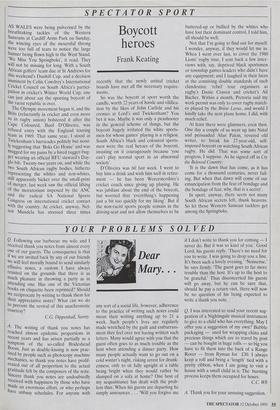SPECTATOR SPORT
Boycott heroes
Frank Keating
AS WALES were being pulverised by the breathtaking tackles of the Western Samoans at Cardiff Arms Park on Sunday, the wincing eyes of the mournful throng were too full of tears to notice the large banner being flown high in the West Stand. We Miss You Springboks', it read. They will not be missing for long. With a South African golfers' team due at St Andrews for this weekend's Dunhill Cup, and a decision imminent by Colin Cowdrey's International Cricket Council on South Africa's partici- pation in cricket's Winter World Cup, one can just about say the sporting boycott of the racist republic is over. The Olympic movement began it, and the Brits (reluctantly in cricket and even more so in rugby union) bolstered it after the Cape Coloured, Basil D'Oliveira, was refused entry with the England touring team in 1969. That same year, I stood at Twickenham's barricades politely but noisi- ly suggesting that `Boks Go Home' and was mugged for my pains by a hired rugger-hug- ger wearing an official RFU steward's Day- glo bib. Twenty-two years on, and while the two South African rugby bodies, hitherto representing the whites and non-whites, still apparently bicker over the small-print of merger, last week saw the official lifting of the moratorium imposed by the ANC and the radical SA National Sports Congress on international cricket contact with the country. At cricket, anyway, Nel- son Mandela has stressed three times recently that the newly united cricket hoards have met all the necessary require- ments.
So was the boycott at sport worth the candle, worth 22 years of hassle and vilifica- tion by the likes of John Carlisle and his cronies at Lord's and Twickenham? You bet it was. Maybe it was only a peashooter in the general scheme of things, but the boycott hugely irritated the white sports- men for whom games' playing is a religion. South Africa's black and coloured sports- men were the real heroes of the boycott, insisting on it courageously because 'you can't play normal sport in an abnormal society'.
D'Oliveira was 60 last week. I went to buy him a drink and wish him well in retire- ment — he has been Worcestershire's cricket coach since giving up playing. He was jubilant about the end of the boycott, but worried that 'everything's happening just a bit too quickly for my liking'. But if the non-racist sports people remain in the driving-seat and not allow themselves to be
buttered-up or bullied by the whites who have lost their dominant control, I told him, all should be well.
Not that I'm going to find out for myself. I wonder, anyway, if they would let me in. When I went over last, to cover the 1980 Lions' rugby tour, I sent back a few inter- views with, say, deprived black sportsmen or township games-leaders who didn't have any equipment; and I laughed in their faces at the conniving double standards of such clandestine 'rebel' tour organisers as rugby's Danie Craven and cricket's All Bacher. Within a month, Pretoria said my work permit was only to cover rugby match- es played by the Britse Leeus, and would I kindly take the next plane home. I did, with much relief.
At least there were glimmers, even then. One day a couple of us went up into Natal and persuaded Alan Paton, revered old writer, to break his 27-year-old, self- imposed boycott on watching South African rugby. He did. That was some sort of progress, I suppose. As he signed off in Cry the Beloved Country: `It is the dawn that has come, as it has come for a thousand centuries, never fail- ing. But when that dawn will come of our emancipation from the fear of bondage and the bondage of fear, why, that is a secret'.
In sport, anyway, there seem not many South African secrets left, thank heavens. So let those Western Samoan tacklers get among the Springboks.


























































 Previous page
Previous page